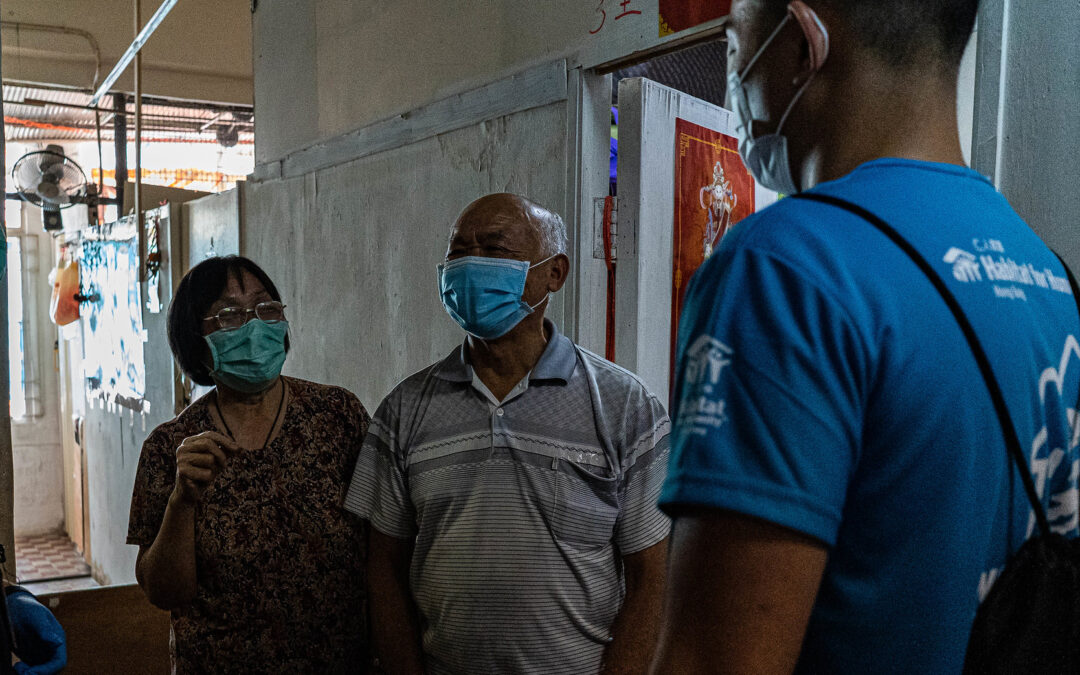Habitat for Humanity Hong Kong is grateful to have had the opportunity to present to the Task Force last October on tenancy control models implemented overseas and alternative models for providing social housing, and etc.
On 31 March 2021 the Task Force for the Study of Tenancy Control in SDUs released their report of recommendations to the Government.
We welcome the Task Force’s recommendation of a written, ‘standard tenancy agreement’ with mandatory terms aimed at increasing protections for SDU tenants. We see this as a large step to increasing security of tenure and decreasing the vulnerability of tenants. If the Government takes up this recommendation into legislation and is able to effectively implement it, tenants will no longer need worry about random or forced eviction for two years and potentially up to four years, and they will also be in a stronger position to access due process and legal remedies. Coupled with a knowledge sharing platform to communicate this new and relevant information, ideally, tenants with standard tenancy agreements will gain legal footing and thus be better positioned to explore and seek fair resolutions when there are disputes with landlords. This situation would be a vast improvement over the current situation in which SDU tenants who lack legally recognized tenancy agreements have little voice or protection within the tenant-landlord relationship and must either defer to their landlords on every issue or risk negative consequences including eviction at any time.
In our conversations with social workers and SDU tenants, we hear over and over again that the affordability of rental costs has been and remains a top concern. The proposed cap on the rate of rent increase is positive, however we share concerns around the lack of recommendations on initial rent costs and other potential fees (deposit, etc). Without a limit on starting rents, it is easy to conceive that they will only increase imposing further financial difficulties on all (especially, as the report points out, in the short term before and during the planning and implementation stages).
As an organization focused on housing and living conditions, we were heartened to see the study suggest the Government consider making repair and maintenance costs tax deductible, or giving SDU owners a subsidy to maintain flats without passing on increased costs to tenants. This suggestion was put forward as one means of offsetting a common unintended consequence of implementing tenancy control – landlords disincentived to maintain or improve their properties when not permitted to increase rents accordingly. We also noted the difficulties in imposing habitability and repair obligations, and the balance of responsibility between landlord and tenant in this regard. We look forward to further Government consideration around ways to improve SDU housing conditions and incentivize landlords.
The Task Force recommendations may not be as comprehensive as had been hoped for by many, but we hail the promise of change in the right direction. There is still a long path of work to be done. We look forward to the Government’s serious consideration of the Task Force recommendations, and their adoption into legislation within the current legislative session.
Relevant excerpts from the report:
94. For example, on maintenance, the study suggests that the Government may allow the cost of repairs and maintenance to be tax deductible or give SDU owners a subsidy for the purpose. To prevent SDU landlords from passing the relevant costs to tenants, the Government may consider requiring all expenses apart from the rent be included in the tenancy agreement and limit such expenses to a percentage of the rent. Furthermore, the study considers that rent control could tackle the issue of information inadequacy in the SDU rental market and lower the rental costs of SDU tenants. (p. 74) 123. Difficulties in imposing “habitability” and “repair’ obligations – Save for the fulfilment of “fitness for habitation” at the commencement of the lease and unless contractually agreed, the common law does not impose upon landlords any positive obligation to repair or otherwise maintain the physical condition of the premises as an ongoing concern. The implied obligation to give the tenant “quite enjoyment” at common law does not generally impose any positive duty on the landlord to conduct repairs or ameliorate a problem which occurs during the lease. The rationale behind is – (a) a tenant rents a premises “as is” at the handover, and would be assumed to be content about its condition by conducting inspections before entering into a lease; (b) very often, any adverse conditions, such as dampness and presence of vermin, are assumed to have been reflected in the level of rent agreed;(c) risk passes once the tenant takes possession. After commencement of a tenancy, a landlord would no longer have much degree of supervision and control over the premises. It is also considered justifiable and convenient that the tenant shall undertake to sort out minor problems since they will be within his reach and capability; and (d) it is often difficult to prove who is at “fault” for defects that emerge later, and whether the property damage was caused by the tenant’s negligence, misuse or “waste”. (p. 83) 124. Even if some mandatory minimum obligation is to be imposed on landlords, setting an objective standard across the board for compliance is no easy task. The meanings of “tenantable” or “habitable” conditions in a dwelling can be relative and subjective. This may vary greatly amongst tenants of different sensitivity, tolerance and needs, etc. The living conditions amongst SDUs can also vary greatly. In the UK, attempts had been made to define “fitness for human habitation” by introducing a series of factors to be determined by local councils, and to require such to be provided by landlords on an ongoing basis. Yet, the provision has invited more questions and there are ongoing debates over what is exactly meant by “reasonably suitable for occupation”. The legal team suggests that if repair obligations are to be imposed on landlords, the law should specifically spell out the “items” to be maintained. The tenant should also be required to grant the landlord with reasonable access to the premises for the latter to carry out the repairs. (p. 84)To discuss how to get involved with Habitat for Humanity and support our public policy and research work, please email Megumi Harker, Public Policy & Research Manager at: megumi.harker@habitat.org.hk
Previous Post:

